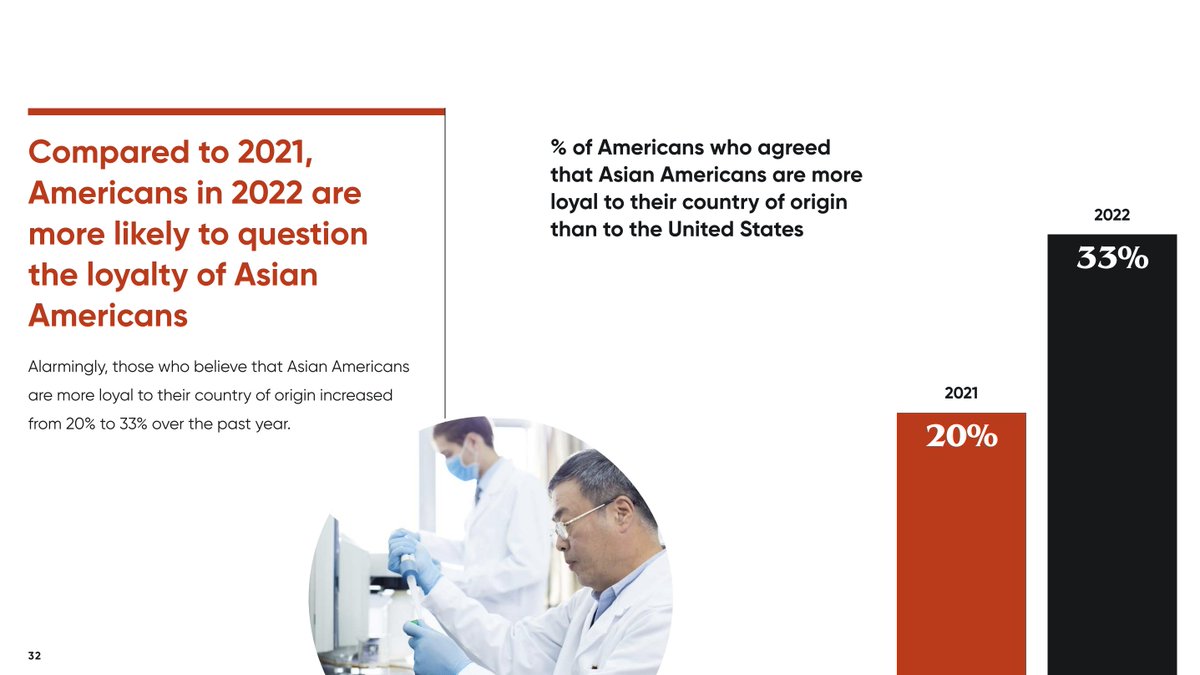
🚨 JUST OUT: The 2022 STAATUS Index
Despite a new administration, attacks against our community continue to increase, reminding us that racism against #AsianAmericans is deeply embedded in US history, culture & institutions, and have been for over 150 years.
🧵 of some findings
Despite a new administration, attacks against our community continue to increase, reminding us that racism against #AsianAmericans is deeply embedded in US history, culture & institutions, and have been for over 150 years.
🧵 of some findings
1/ Compared to 2021, Americans in 2022 are nearly TWICE as likely to say that #AsianAmericans are at least partly responsible for #COVID19: 11% vs 21% 

2/ Alarmingly, in 2022, 33% Americans believe that #AsianAmericans are MORE LOYAL to their country of origin than to the United States, up from 20% in 2021.
#AAPIHeritageMonth #AAPIHM #APAHM
#AAPIHeritageMonth #AAPIHM #APAHM

3/ While anti-Asian violence and hate have INCREASED over the past year, 33% of Americans are unaware that attacks against #AsianAmericans are increasing.
#AAPIHeritageMonth #AAPIHM #APAHM
#AAPIHeritageMonth #AAPIHM #APAHM

4/ We shouldn’t be surprised that one-third of Americans are unaware that anti-Asian violence is increasing since 42% of Americans cannot think of a single policy or experience related to #AsianAmericans.
#AAPIHeritageMonth #AAPIHM #APAHM
#AAPIHeritageMonth #AAPIHM #APAHM

5/ Even more glaring, 58% of Americans CANNOT name a single prominent #AsianAmerican.
Among those who do, the most popular answers are #JackieChan (who is not American) and #BruceLee (who died half a century ago).
#AAPIHeritageMonth #AAPIHM #APAHM
Among those who do, the most popular answers are #JackieChan (who is not American) and #BruceLee (who died half a century ago).
#AAPIHeritageMonth #AAPIHM #APAHM

6/ Given the invisibility of #AsianAmericans in the American imagination, it comes as little surprise that ONLY 29% of #AsianAmericans completely agree that they feel like they belong and are accepted in the US.
#AAPIHeritageMonth #AAPIHM #APAHM
#AAPIHeritageMonth #AAPIHM #APAHM

7/ On BELONGING & ACCEPTANCE
US-born and younger #AsianAmericans are LESS likely to completely agree that they feel like they belong and are accepted in the United States compared to foreign-born and older Asian Americans.
#AAPIHeritageMonth #AAPIHM #APAHM

US-born and younger #AsianAmericans are LESS likely to completely agree that they feel like they belong and are accepted in the United States compared to foreign-born and older Asian Americans.
#AAPIHeritageMonth #AAPIHM #APAHM


8/ Do #AsianAmericans see themselves as closer to people of color or to whites?
** 76% of #AsianAmericans perceive their status as CLOSER to POC than to whites.
By contrast, 69% of whites perceive the status of Asian Americans as CLOSER to whites.
** 76% of #AsianAmericans perceive their status as CLOSER to POC than to whites.
By contrast, 69% of whites perceive the status of Asian Americans as CLOSER to whites.

9/ ON PERCEPTIONS ABOUT CORPORATE LEADERSHIP
50% of Americans believe that #AsianAmericans are well-represented in senior positions in companies and corporate boards, YET ONLY 6% of senior level positions are filled by Asian Americans.
#AAPIHeritageMonth #AAPIHM #APAHM
50% of Americans believe that #AsianAmericans are well-represented in senior positions in companies and corporate boards, YET ONLY 6% of senior level positions are filled by Asian Americans.
#AAPIHeritageMonth #AAPIHM #APAHM

10/ On a more encouraging note, a majority of Americans across the political spectrum believe that #AsianAmericans have benefited the United States.
#AAPIHeritageMonth #AAPIHM #APAHM
#AAPIHeritageMonth #AAPIHM #APAHM

11/ A majority of Americans believe that anti-Asian racism should be addressed & pointed to #education as the path.
Teaching about AsianAmericans—alongside AfricanAmericans, NativeAmericans & LatinoAmericans—will help educate Americans about the fraught history of #AsianAmerica.
Teaching about AsianAmericans—alongside AfricanAmericans, NativeAmericans & LatinoAmericans—will help educate Americans about the fraught history of #AsianAmerica.

• • •
Missing some Tweet in this thread? You can try to
force a refresh




